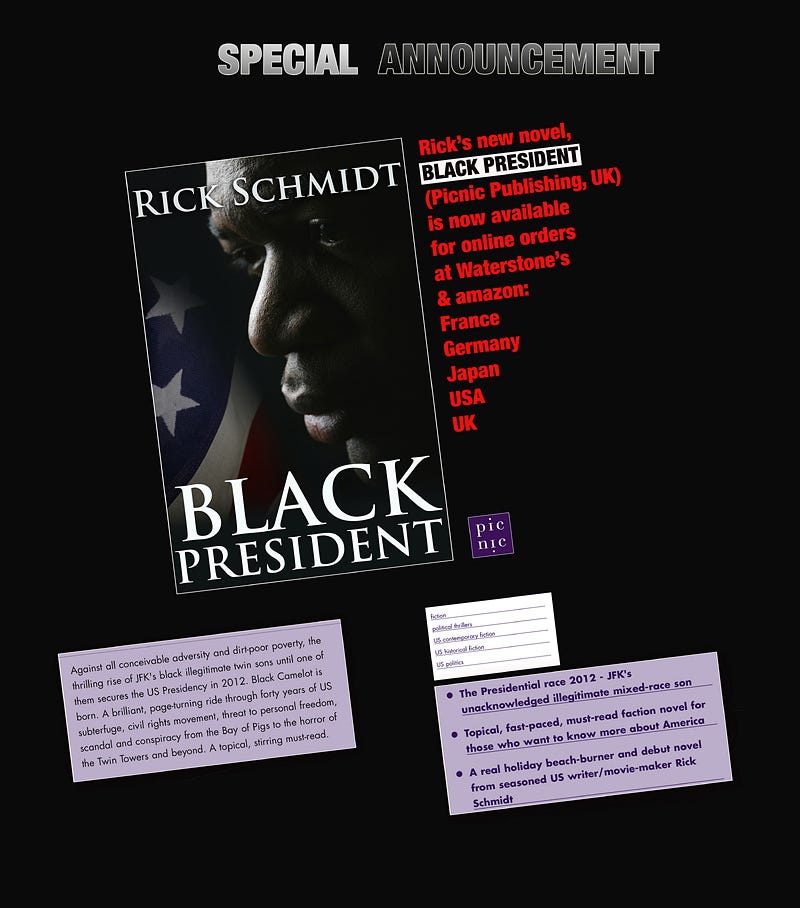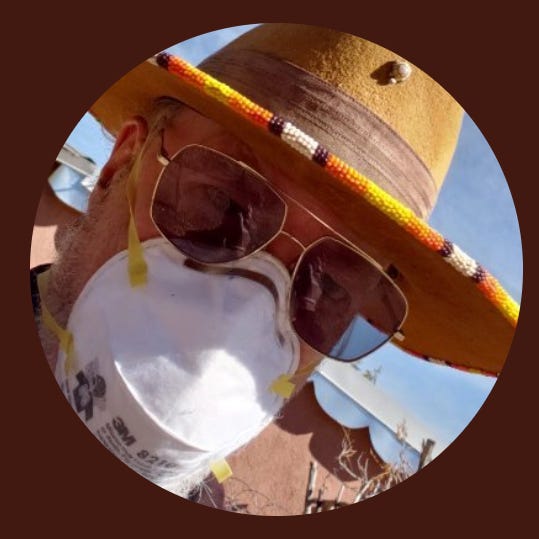BLACK PRESIDENT, CHAPTER 6. Get your "Picnic Publishing, UK, 1st ed." paperbacks here; https://www.amazon.com/Black-President-Historical-Rick-Schmidt/dp/0955861314
BLACK PRESIDENT, CHAPTER 6. https://www.amazon.com/dp/B08NWCN6X. At the Coke bottling facility Rudy helps a new employee, Sal, but can't get no satisfaction. Birdie reads "The Ugly Duckling" to kids.
Original ad for BLACK PRESIDENT (Picnic Publishing UK, ©2008).
————-
CHAPTER SIX
As Rudy watched the Coke bottles whirl past him in front of the light box, checking for any imperfections or foreign deposits, he noticed the foreman walking a new guy to the end of the belt. For fifteen minutes Rudy stood by, watching as the beleaguered newcomer, called “Sal,” undertook the task of unloading heavy wooden crates full of half-gallon bottles, trying to load them onto a skiff. As more and more crates arrived, Sal started to strain, face turning beet red, arms shaking, legs twitching as he lifted them higher and higher. It was a horrible sight, but one that in some way seemed irresistible to other people. There was something basely fascinating about seeing a fellow human suffering with no relief – at least for a second or two before the “good samaritan” gene cut in. The simple fact was that there was no way anyone could actually lift those heavy weights over his head repeatedly and still keep up with the belt.
Recent-and-unwanted trainees, too egotistical to doubt their strength, never saw it coming until it was too late. The vets let assholes flunk. In this case, it was probably Sal’s spare frame and finely chiseled Indian-from-India meek-looking face, that saved him. After watching the floundering novice for about half a shift, Rudy finally decided to give the kid a break.
As Sal strained to set another crate atop the six-and-a-half-foot- high pile, Rudy strolled over from his bottle testing station, temporarily blocked Sal long enough to catch the next crate off the belt, and loudly called out, “Watch me!” Rudy took one quick step toward the skiff, let the heavy crate swing forward, then stepped back, letting the crate reach an even higher level at the end of his pendulum arms. Moving forward again made the crate fly high enough that Rudy could release it at head-level. The twenty-five pounds of bottles and wood found the open slot on the skiff and hit perfectly, crunching right into the top of the pile. With two steps back Rudy grabbed the next crate off the belt and repeated the dance -- two steps forward, let the crate swing, step back and use the pendulum action to raise the crate still higher, then with a final step forward, let the crate fly, holding on while aiming and landing the bulky missile, thus laying another box of Cokes onto the pile.
After showing Sal three more such maneuvers, Rudy stepped back to watch his protégé repeat the motion. Rudy watched the kid quickly pick up the technique. Wiping the perspiration from his forehead, Sal voiced his gratitude to Rudy at the top of his lungs, waving his right hand in a sort of salute as he reached over to grab the next load.
Taking a break from work the following day, Rudy bumped into Sal in the men’s bathroom and decided to once again test his Kennedy story, hoping the newcomer would be a more forgiving audience than others around the plant. By recently reliving the plane ride, remembering Sarah’s honest face and words, Rudy was, more than ever, convinced the Kennedy story had actually happened. But to make sure that his story worked this time, he decided to fabricate certain details, pump up his delivery to avoid a repeat of the earlier failed lunchtime sidewalk telling. So Rudy began with explaining Kennedy’s seduction, blow by blow. He first described the blue carpet and Presidential seal, then got to the secret room off the Oval office and the red blankets (the “red” color was Rudy’s first invention – it just sounded so right).
Getting fully into a storytelling jag, Rudy poured out the improved“facts”effortlessly. He told Sal how Kennedy had peeled back the blanket so they’d have soft white sheets against their bare skin. Sal’s dark face began to glow with interest. When Rudy noticed Sal’s lips part slightly, he sensed that he was finally making an impression on somebody. Rudy observed Sal’s eyes looking slightly dilated when he closed them down and thought he might finally have achieved the proper effect the story deserved. In a final push, he tried to wrap things up with a bang.
Rudy paused for an interminable ten seconds, then explained that Kennedy’s gold wristwatch had ended up pressed against the side of Sarah’s face during lovemaking. He elaborated on how she had turned her head slightly to line it up with her right ear so she could hear the ticking. And he finished off the tale by telling how, on the floor afterward, Sarah had dangled her hand and left a mark, created a circle in the light dust and drawn in her initial.
“That’s what she said...” repeated Rudy, feeling his imagination hitting high gear. “She wrote the letter “S” in the middle – right in the dust – which may still be there even now.”
Rudy peered straight into Sal’s eyes, as he wrapped up. “That’s definite proof that...that she had...”
Rudy cast a furtive glances at the wall clock in the restroom, watching the seconds tick down to 10:45AM, the end of his break. Some gurgling sounds from somewhere back behind one of the men’s toilets made Rudy jump. Sal began to open his mouth to speak, parted his lips wide enough to inhale a large breath, then blow out with a sigh attached. His soiled leather boots shifted on the concrete, scuffing the toe a bit as if to remove a dirt particle. He then turned away from Rudy, faced the bathroom mirror and made eye contact with himself for a long second before running some cold water over his hands.
***
April 19, 1961
On Wednesday, John Kennedy broke his earlier pledge not to use U.S. forces under any circumstances, ordering B-26s from the U.S.S. Essex to make a run over the beach and land more ammunition. But it was too late. When Dean Rusk, at a meeting, had blurted out that “a deeper commitment” was needed, Kennedy had held his right hand up under his nose and said, “we’re already in it up to here.”
Watching the President’s body language as he passed through the breakfast room, Birdie knew he was having a difficult time. He seemed like a good man, she thought, a fair man, and she had hoped that before her job was terminated she could help him learn about her troubled black community, explain just how difficult it was to be a colored person in 1960’s America. She wanted to reveal all the pain she knew – racism and hard times she’d experienced back in her hometown of Montgomery, Alabama, and Chicago, not to mention Washington, DC. She wondered how a Kennedy, or any rich white person for that matter, could ever know how she and her people lived.
After washing the Kennedy kids’ hands, making it a game as she always did of cleaning off the sticky stuff for “Mr. Books,” Birdie accompanied Caroline and John John into the second floor nursery and sat down for reading time. From Mrs. Kennedy’s well-stocked library of children’s classics she selected “The Ugly Duckling” and started in. As the kids drew close she had to admit that it felt good to cuddle with them, realizing she actually did have feelings toward the small and innocent aristocrats.
“And so, all the pretty white ducks would have nothing to do with the odd-shaped outsider, its black color and funny feathers as repellent as the rain. The duck was sad, very sad, because it had no friends at all,” Birdie continued, her southern drawl bringing a certain familiarity to the tale.
Caroline suddenly broke in, as she often did during story hour, “Those other ducks are mean, aren’t they?”
“Yes, Caroline honey,” said Birdie, speaking as clearly and distinctly as possible. “It is wrong to be mean to someone else just because of the color of their skin.”
Birdie was always surprised to see a conscience at work in such small children. They seemed to know instinctively what was right and what was wrong. At least she could reinforce color-blindness in her two charges while she had the chance.
“The duck is black, just like my arm,” said Birdie, showing off her dark skin to each child as if she was a guinea pig in a science lab at school.
“Where else am I black?” she asked, again making eye contact with each child.
“Your face is black,” said Caroline, pointing with the index finger of her right hand, moving it toward Birdie until it just barely touched her black cheek. One-year-old John John stuck his little finger out too, showing birdie that the small child, hardly more than a baby, was trying to participate as well
“That’s right, honey” said Birdie, giving a short laugh. Caroline was always on target, her mind always hitting at the center of things. When Birdie laughed the kids giggled too.
“So, would those white ducks have liked me?”
“No. You’re black!” said Caroline, sure of her answer.
“What color of duckling would you and your brother be?” asked
Birdie, shifting the focus again.
“White,” said Caroline. “We’re white and you’re black.”
Birdie didn’t say more. She just proceeded on with the story, redressing how mean the white ducks were to the poor, ugly, black duckling. When she described how sad the ugly duckling felt, she could see tears well up in Caroline’s eyes. These were good kids, Birdie thought to herself. The tears gave her some hope for the future.
————






Wow! Birdie could write a book of her own!!